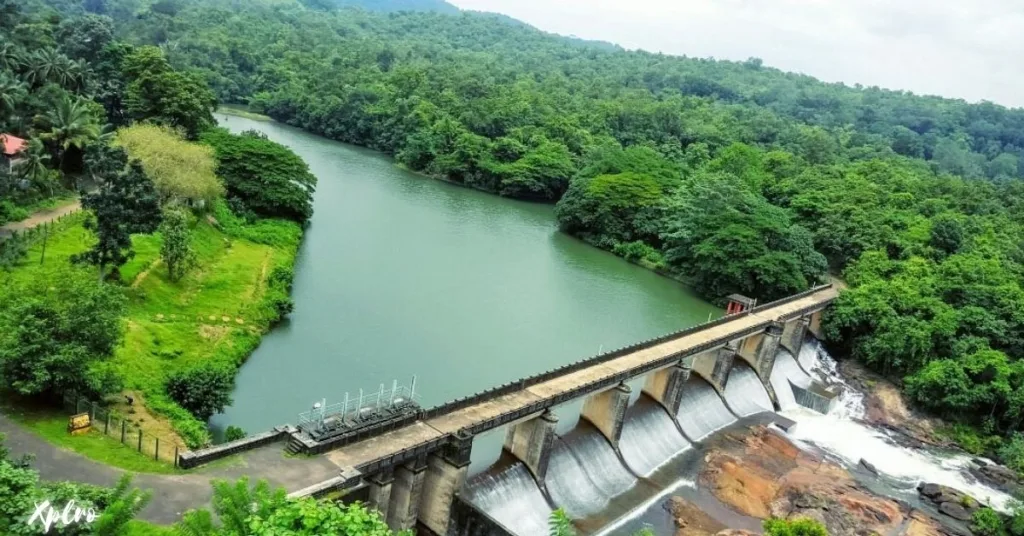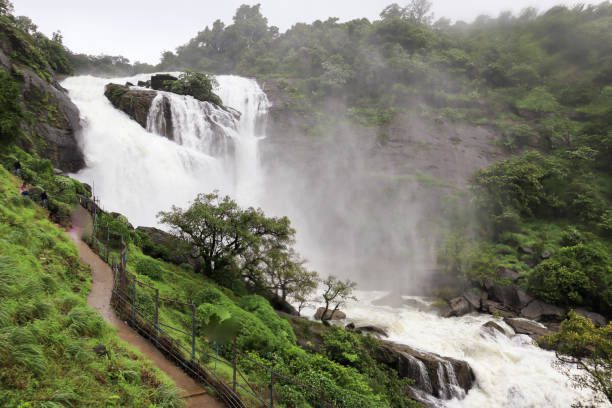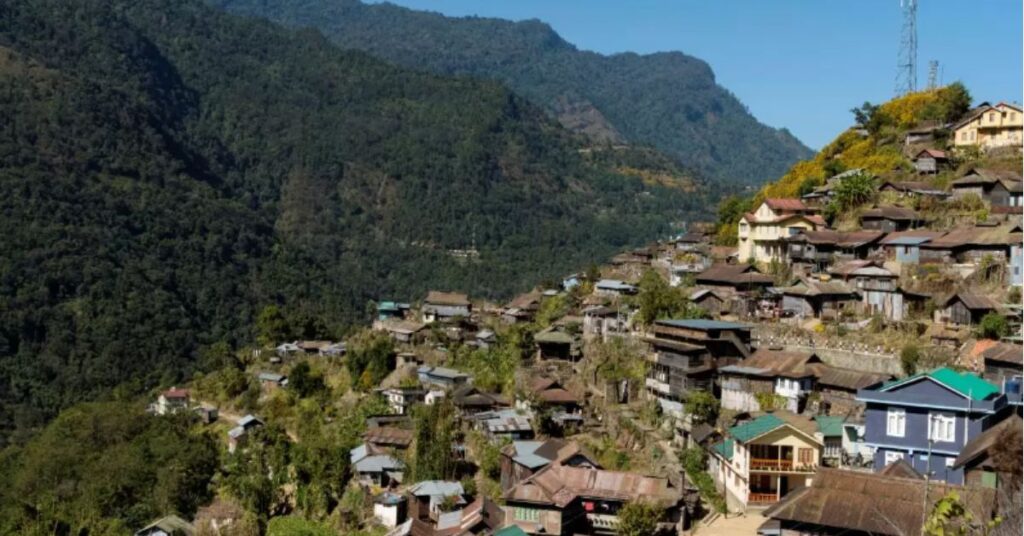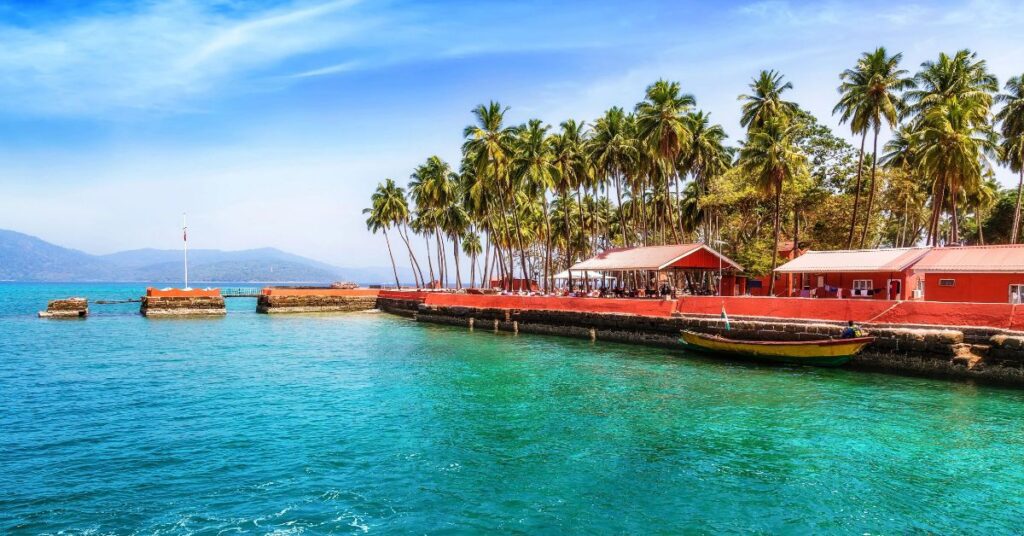Eco-Friendly Vacation Spots in India; More and more people are choosing eco-tourism to explore our planet in a way that’s kind to the environment. India, with its amazing nature and rich culture, is a great place for eco-friendly vacations. You can find peaceful and unique places that also protect the environment. From beautiful forests to stunning coastlines, here are the top 10 eco-friendly destinations in India for responsible travelers.
- 1. Sunderbans National Park, West Bengal
- 2. Kaziranga National Park, Assam
- 3. Thenmala, Kerala
- 4. Mawlynnong, Meghalaya
- 5. Periyar Wildlife Sanctuary, Kerala
- 6. Coorg (Kodagu), Karnataka
- 7. Khonoma Green Village, Nagaland
- 8. Andaman and Nicobar Islands
- 9. Spiti Valley, Himachal Pradesh
- 10. Rishikesh, Uttarakhand
- Conclusion
- FAQs
1. Sunderbans National Park, West Bengal

A UNESCO World Heritage Site: The Sunderbans is one of the world’s largest mangrove forests.
Home to Diverse Wildlife: This unique ecosystem is home to the elusive Royal Bengal tiger and many other species.
Conservation Efforts: Local communities and conservation organizations are working hard to protect this fragile environment.
Eco-Friendly Tourism:
- Guided boat safaris
- Mangrove ecosystem education
- Visits to local conservation projects
2. Kaziranga National Park, Assam

A Wildlife Haven: Kaziranga National Park is renowned for its Indian one-horned rhinoceros population.
Conservation Focus: The park prioritizes wildlife conservation and limits tourism to specific zones.
Eco-Friendly Tourism: Local guides and eco-lodges adhere to strict environmental guidelines.
Activities:
- Jeep and elephant safaris
- Birdwatching
- Cultural experiences with indigenous communities
3. Thenmala, Kerala

A Pioneer in Eco-Tourism: Thenmala is India’s first planned eco-tourism destination, nestled in the Western Ghats.
Nature and Community: The project focuses on preserving the natural environment and providing livelihood opportunities for local communities.
Activities:
- Trekking
- Biking
- Boating
- Exploring the Thenmala Eco-Tourism Park (Culture, Leisure, and Adventure zones)
4. Mawlynnong, Meghalaya

A Model Village: Mawlynnong, often hailed as “Asia’s Cleanest Village,” is a testament to sustainable living.
Community-Driven Sustainability: The village’s cleanliness initiatives and innovative use of bamboo for construction and waste management are truly inspiring.
Activities:
- Explore the iconic living root bridges
- Trek to breathtaking waterfalls
- Immerse yourself in the rich culture of the Khasi tribe
5. Periyar Wildlife Sanctuary, Kerala

A Green Haven: Periyar National Park, located in the Western Ghats, is renowned for its lush forests and diverse wildlife.
Sustainable Exploration: The park offers eco-friendly activities like bamboo rafting and guided nature walks, emphasizing environmental education.
Activities:
- Nature walks
- Bamboo rafting
- Learning about local flora and fauna
6. Coorg (Kodagu), Karnataka

A Serene Retreat: Coorg, a charming hill station, is famous for its lush coffee plantations.
Sustainable Practices: Local resorts and homestays are committed to eco-friendly practices, including sustainable farming, rainwater harvesting, and forest conservation.
Activities:
- Eco-treks through coffee plantations
- Visits to local wildlife sanctuaries
- Farm-to-table experiences
7. Khonoma Green Village, Nagaland

A Sustainable Model: Khonoma is a pioneer in sustainable living, earning the title of India’s first green village.
Community-Driven Conservation: The villagers have taken significant steps to protect the environment, including banning hunting and establishing community forests.
Activities:
- Heritage walks
- Learning about traditional Naga culture
- Hiking in the surrounding forests
8. Andaman and Nicobar Islands

A Marine Wonderland: These islands are renowned for their crystal-clear waters and diverse marine life.
Protecting the Ocean: Local communities and organizations are working to reduce plastic pollution, conserve coral reefs, and protect endangered marine species.
Eco-Friendly Activities:
- Scuba diving
- Snorkeling
- Exploring mangrove forests
- Learning about turtle conservation
9. Spiti Valley, Himachal Pradesh

A Remote Beauty: Spiti Valley, a cold desert mountain valley, offers breathtaking landscapes and serene solitude.
Sustainable Tourism: Local communities are committed to sustainable tourism, promoting eco-friendly homestays and waste management practices.
Activities:
- Exploring ancient monasteries
- High-altitude trekking
- Volunteering in community-led eco-projects
10. Rishikesh, Uttarakhand

Yoga’s Holy Ground: Rishikesh, the yoga capital of the world, offers a serene and eco-conscious atmosphere along the banks of the Ganges River.
Sustainable Practices: Many ashrams and retreats in Rishikesh are dedicated to sustainable living, organic farming, and river conservation.
Activities:
- Yoga and meditation in nature
- Participating in Ganga cleaning drives
- Eco-friendly river rafting adventures
Tips for Eco-Friendly Vacation Spots in India
- Choose Eco-Friendly Accommodations: Opt for lodges that prioritize sustainability, such as energy efficiency, waste reduction, and supporting local communities.
- Reduce Plastic Use: Carry a reusable water bottle and decline single-use plastic items.
- Respect Wildlife: Maintain a safe distance from animals, avoid feeding them, and follow guidelines during wildlife safaris.
- Support Local Economy: Purchase handicrafts and food from local vendors to contribute to the community’s livelihood.
Conclusion
India, a land of rich biodiversity and cultural heritage, offers a plethora of eco-friendly destinations. From the serene backwaters of Kerala to the snow-capped peaks of the Himalayas, there’s something for every eco-conscious traveler. By choosing sustainable accommodations, minimizing plastic usage, respecting wildlife, and supporting local communities, you can contribute to the preservation of these natural wonders. So, pack your bags, embrace the spirit of adventure, and embark on a journey that’s both fulfilling and sustainable. Happy exploring with Xplro.com!
FAQs
1. What is eco-tourism, and why does it matter?
- Eco-tourism is responsible travel to natural environments that aims to conserve resources, promote sustainability, and benefit local communities. It is significant because it raises awareness about environmental conservation, reduces the negative impacts of tourism, and provides economic opportunities for indigenous people.
2. What are some sustainable tourism practices in India?
- Key sustainable practices include staying at eco-friendly accommodations, using reusable items like water bottles, minimizing plastic waste, respecting local wildlife, engaging in conservation efforts, and supporting locally-owned businesses. These practices ensure a minimal ecological footprint and support cultural preservation.
3. Can I find eco-friendly places to stay at these destinations?
- Yes, there are numerous eco-friendly lodging options, such as eco-resorts, sustainable homestays, and nature lodges. These establishments often employ practices like renewable energy use, water conservation, and waste recycling, ensuring that your stay is both comfortable and environmentally friendly.
4. What should I bring for an eco-friendly trip to India?
- Pack eco-friendly items like a reusable water bottle, biodegradable toiletries, a cloth shopping bag, sustainable sunscreen, and reusable cutlery. Additionally, bring weather-appropriate clothing and avoid single-use plastics. Prioritizing these items helps minimize waste during your travels.
5. How does eco-tourism benefit local communities?
- Eco-tourism creates employment opportunities, fosters cultural exchanges, and promotes sustainable economic growth. By supporting local artisans, guides, and conservation efforts, travelers contribute to the preservation of natural and cultural heritage and empower local communities to maintain their way of life.
6. Are eco-friendly destinations family-friendly?
- Yes, many eco-friendly destinations offer safe and enriching experiences for families. Activities such as wildlife safaris, guided nature walks, and cultural village tours are often suitable for all ages. It is important to choose activities that cater to your family’s needs and adhere to safety precautions.
7. Can I get involved in conservation projects while visiting?
- Definitely! Many eco-friendly spots offer volunteer opportunities where visitors can participate in conservation work like tree planting, wildlife protection, or community clean-up drives. These experiences provide meaningful ways to contribute to local environmental efforts while enjoying your vacation.
8. How can I reduce my environmental footprint when traveling?
- Travel mindfully by using eco-friendly transportation, bringing reusable items, conserving water, and choosing sustainable accommodations. Avoid disturbing wildlife and dispose of waste properly. By making these small changes, you can significantly reduce your environmental impact.
9. When is the best time to visit eco-friendly destinations in India?
- The best travel season varies by location. For example, the Sunderbans are ideal from October to March, while Spiti Valley is accessible from May to October. Researching specific climate conditions and choosing the right time helps you experience the best of each destination with minimal environmental stress.
10. Are these eco-friendly locations suitable for all types of travelers?
- Yes, most eco-friendly locations are accessible to solo travelers, families, and even older visitors. Many places offer guided tours and have well-maintained facilities. However, it’s essential to check in advance for any accessibility concerns, especially for activities that may require physical effort.
11. How do eco-friendly activities differ from conventional tourism?
- Eco-friendly activities emphasize conservation and responsible engagement with nature. Examples include wildlife watching with expert guides, visiting organic farms, and engaging in cultural exchanges. Traditional tourism may lack a focus on sustainability and sometimes causes harm to local ecosystems through pollution or overuse.
12. What challenges does India face in promoting eco-tourism?
- Promoting eco-tourism in India comes with challenges like limited infrastructure in remote areas, a lack of widespread awareness, balancing environmental protection with visitor needs, and insufficient support from authorities in some regions. Continuous efforts in education, better eco-tourism policies, and community-driven initiatives are vital to overcoming these hurdles.




